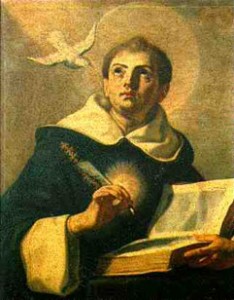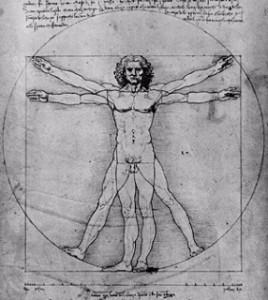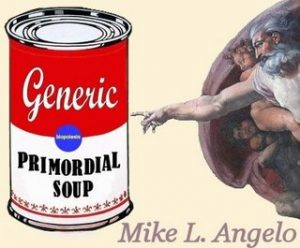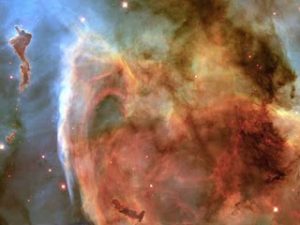
Background:
St. Thomas Aquinas (1224-1274) was a Dominican priest, theologian, and philosopher. Called the Doctor Angelicus (the Angelic Doctor,) Aquinas is considered one the greatest Christian philosophers to have ever lived. Two of his most famous works, the Summa Theologiae and the Summa Contra Gentiles, are the finest examples of his work on Christian philosophy.
——————————————————————————–
“The truth of the Christian faith…surpasses the capacity of reason, nevertheless that truth that the human reason is naturally endowed to know can not be opposed to the truth of the Christian faith.”
——————————————————————————–
1. First Way:
The Argument From Motion
St. Thomas Aquinas, studying the works of the Greek
philosopher Aristotle, concluded from common observation that an object that is in motion (e.g. the planets, a rolling stone) is put in motion by some other object or force. From this, Aquinas believes that ultimately there must have been an UNMOVED MOVER (GOD) who first put things in motion. Follow the
argument this way:
1) Nothing can move itself.
2) If every object in motion had a mover, then the first object in motion needed a mover.
3) This first mover is the Unmoved Mover, called God.
——————————————————————————–
2. Second Way:
Causation Of Existence
This Way deals with the issue of existence. Aquinas concluded that common sense observation tells us that no object creates itself. In other words, some previous object had to create it. Aquinas believed that ultimately there must have been an
UN CAUSED FIRST CAUSE (GOD) who began the chain of existence for all things. Follow the
argument this way:
1) There exists things that are caused (created) by other things.
2) Nothing can be the cause of itself (nothing can create itself.)
3) There can not be an endless string of objects causing other objects to exist.
4) Therefore,
there must be an
uncaused first cause called God.
——————————————————————————–
3. Third Way:
Contingent and Necessary Objects 
This Way defines two types of objects in the universe: contingent beings and necessary beings. A contingent being is an object that can not exist without a necessary being causing its existence. Aquinas believed that the existence of contingent beings would ultimately
necessitate a being which must exist for all of the contingent beings to exist. This being, called a necessary being, is what we call God. Follow the argument this way:
1) Contingent beings are caused.
2) Not every being can be contingent.
3) There must exist a being which is necessary to cause contingent beings.
4) This necessary being is God.
——————————————————————————–
4. Fourth Way:
Argument From
Degrees And Perfection
St. Thomas formulated this Way from a very interesting observation about the qualities of things. For example one may say that of two marble
sculptures one is more beautiful than the other. So for these two objects, one has a greater degree of beauty than the next. This is referred to as degrees or gradation of a quality. From this fact Aquinas concluded that for any given quality (e.g. goodness, beauty, knowledge) there must be a perfect standard by which all such qualities are measured. These perfections are contained in God.
——————————————————————————–
5. Fifth Way: The
Argument From
Intelligent Design
The final Way that St. Thomas Aquinas speaks of has to do with the observable universe and the order of nature. Aquinas states that common sense tells us that the universe works in such a way, that one can conclude that is was designed by an intelligent designer, God. In other words, all physical laws and the order of nature and life were designed and ordered by God, the
intelligent designer.
Source: Paley’s Teleological Argument.
 Background:
St. Thomas Aquinas (1224-1274) was a Dominican priest, theologian, and philosopher. Called the Doctor Angelicus (the Angelic Doctor,) Aquinas is considered one the greatest Christian philosophers to have ever lived. Two of his most famous works, the Summa Theologiae and the Summa Contra Gentiles, are the finest examples of his work on Christian philosophy.
——————————————————————————–
“The truth of the Christian faith…surpasses the capacity of reason, nevertheless that truth that the human reason is naturally endowed to know can not be opposed to the truth of the Christian faith.”
——————————————————————————–
1. First Way: The Argument From Motion
Background:
St. Thomas Aquinas (1224-1274) was a Dominican priest, theologian, and philosopher. Called the Doctor Angelicus (the Angelic Doctor,) Aquinas is considered one the greatest Christian philosophers to have ever lived. Two of his most famous works, the Summa Theologiae and the Summa Contra Gentiles, are the finest examples of his work on Christian philosophy.
——————————————————————————–
“The truth of the Christian faith…surpasses the capacity of reason, nevertheless that truth that the human reason is naturally endowed to know can not be opposed to the truth of the Christian faith.”
——————————————————————————–
1. First Way: The Argument From Motion St. Thomas Aquinas, studying the works of the Greek philosopher Aristotle, concluded from common observation that an object that is in motion (e.g. the planets, a rolling stone) is put in motion by some other object or force. From this, Aquinas believes that ultimately there must have been an UNMOVED MOVER (GOD) who first put things in motion. Follow the argument this way:
1) Nothing can move itself.
2) If every object in motion had a mover, then the first object in motion needed a mover.
3) This first mover is the Unmoved Mover, called God.
——————————————————————————–
2. Second Way: Causation Of Existence
St. Thomas Aquinas, studying the works of the Greek philosopher Aristotle, concluded from common observation that an object that is in motion (e.g. the planets, a rolling stone) is put in motion by some other object or force. From this, Aquinas believes that ultimately there must have been an UNMOVED MOVER (GOD) who first put things in motion. Follow the argument this way:
1) Nothing can move itself.
2) If every object in motion had a mover, then the first object in motion needed a mover.
3) This first mover is the Unmoved Mover, called God.
——————————————————————————–
2. Second Way: Causation Of Existence This Way deals with the issue of existence. Aquinas concluded that common sense observation tells us that no object creates itself. In other words, some previous object had to create it. Aquinas believed that ultimately there must have been an UN CAUSED FIRST CAUSE (GOD) who began the chain of existence for all things. Follow the argument this way:
1) There exists things that are caused (created) by other things.
2) Nothing can be the cause of itself (nothing can create itself.)
3) There can not be an endless string of objects causing other objects to exist.
4) Therefore, there must be an uncaused first cause called God.
——————————————————————————–
3. Third Way: Contingent and Necessary Objects
This Way deals with the issue of existence. Aquinas concluded that common sense observation tells us that no object creates itself. In other words, some previous object had to create it. Aquinas believed that ultimately there must have been an UN CAUSED FIRST CAUSE (GOD) who began the chain of existence for all things. Follow the argument this way:
1) There exists things that are caused (created) by other things.
2) Nothing can be the cause of itself (nothing can create itself.)
3) There can not be an endless string of objects causing other objects to exist.
4) Therefore, there must be an uncaused first cause called God.
——————————————————————————–
3. Third Way: Contingent and Necessary Objects  This Way defines two types of objects in the universe: contingent beings and necessary beings. A contingent being is an object that can not exist without a necessary being causing its existence. Aquinas believed that the existence of contingent beings would ultimately necessitate a being which must exist for all of the contingent beings to exist. This being, called a necessary being, is what we call God. Follow the argument this way:
1) Contingent beings are caused.
2) Not every being can be contingent.
3) There must exist a being which is necessary to cause contingent beings.
4) This necessary being is God.
——————————————————————————–
4. Fourth Way: Argument From Degrees And Perfection
This Way defines two types of objects in the universe: contingent beings and necessary beings. A contingent being is an object that can not exist without a necessary being causing its existence. Aquinas believed that the existence of contingent beings would ultimately necessitate a being which must exist for all of the contingent beings to exist. This being, called a necessary being, is what we call God. Follow the argument this way:
1) Contingent beings are caused.
2) Not every being can be contingent.
3) There must exist a being which is necessary to cause contingent beings.
4) This necessary being is God.
——————————————————————————–
4. Fourth Way: Argument From Degrees And Perfection St. Thomas formulated this Way from a very interesting observation about the qualities of things. For example one may say that of two marble sculptures one is more beautiful than the other. So for these two objects, one has a greater degree of beauty than the next. This is referred to as degrees or gradation of a quality. From this fact Aquinas concluded that for any given quality (e.g. goodness, beauty, knowledge) there must be a perfect standard by which all such qualities are measured. These perfections are contained in God.
——————————————————————————–
5. Fifth Way: The Argument From Intelligent Design
St. Thomas formulated this Way from a very interesting observation about the qualities of things. For example one may say that of two marble sculptures one is more beautiful than the other. So for these two objects, one has a greater degree of beauty than the next. This is referred to as degrees or gradation of a quality. From this fact Aquinas concluded that for any given quality (e.g. goodness, beauty, knowledge) there must be a perfect standard by which all such qualities are measured. These perfections are contained in God.
——————————————————————————–
5. Fifth Way: The Argument From Intelligent Design The final Way that St. Thomas Aquinas speaks of has to do with the observable universe and the order of nature. Aquinas states that common sense tells us that the universe works in such a way, that one can conclude that is was designed by an intelligent designer, God. In other words, all physical laws and the order of nature and life were designed and ordered by God, the intelligent designer.
Source: Paley’s Teleological Argument.
The final Way that St. Thomas Aquinas speaks of has to do with the observable universe and the order of nature. Aquinas states that common sense tells us that the universe works in such a way, that one can conclude that is was designed by an intelligent designer, God. In other words, all physical laws and the order of nature and life were designed and ordered by God, the intelligent designer.
Source: Paley’s Teleological Argument.








